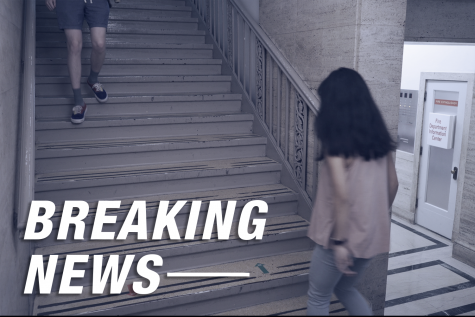BREAKING: College alters reopening plan for ongoing assessments and installations
September 18, 2020

Updated on Saturday, Sept. 19 with information from Associate Vice President of Strategic Communications and External Relations Lambrini Lukidis.
Three days before hybrid and in-person classes were to begin, the administration announced that some sessions will be delayed for at least a week due to additional air quality assessments and ultraviolet air treatments.
In a Friday, Sept. 18 email to faculty and staff, Senior Vice President and Provost Marcella David said, “This means that some of these courses will start in-person instruction September 28 instead of September 21 or will require other adjustments to pedagogy or location.”
A separate Friday, Sept. 18 collegewide message from the Office of the Chief Financial Officer stated that due to ongoing air assessments and the late arrival of orders of Ultraviolet Germicidal Irradiation (UVGI) units, the face-to-face start for some classes slated to begin hybrid or in-person instruction Monday, Sept. 21 will be altered.
“This may mean delaying the start of in-person activities, changing the class location for next week, or adjusting the planned activities,” the email said.
The Office of the Provost and the Facilities and Operations team reviewed the number of impacted courses with deans and department chairs, according to the email from the Office of the Chief Financial Officer.
Associate Vice President of Strategic Communications and External Relations Lambrini Lukidis said in a Friday, Sept. 18 email to the Chronicle that up to 90 course sections may be delayed or otherwise affected by this, but the number could decrease as the assessments are completed.
Faculty teaching courses where an adjustment is necessary will be contacted by department chairs, and faculty will then communicate any changes with students. On-campus activities for other courses that do not need an adjustment will begin on campus next week as planned, the email said.
The collegewide message said Columbia has received ongoing outside guidance from a team of epidemiology and infection-control experts at Rush University Medical Center and Dr. Emily Landon, executive medical director of infection prevention and control at the University of Chicago.
The college said source controls including limited occupancy, social distancing, sanitation and masks are most effective in controlling the spread of the coronavirus. As a secondary measure the college has also conducted air assessments of some campus spaces and added Ultraviolet Germicidal Irradiation (UVGI) to heating, ventilation and air conditioning (HVAC) systems in certain spaces where there will likely be more “significant physical exertion.”
While air assessments are still ongoing, the collegewide email said RAM Mechanical Services, a full-service mechanical contracting firm, has conducted a few assessments in spaces “where specialized instruction takes place that goes beyond a regular socially distanced, masked college classrooms where the main activity is sitting and speaking.” This includes spaces in the Music, Theatre and Cinema and Television Arts departments and some photo spaces.
In a Thursday, Sept. 17 interview with the Chronicle, Part-Time Faculty Union President Diana Vallera said the union has pleaded with the college for weeks to complete these assessments before people return to campus.
Vallera, an adjunct faculty member in the Photography Department, said although she is happy the college is conducting the assessments in various rooms around campus, the assessments need to be done in every space on campus. She said if they are not, people should not be returning.
“I don’t know why this wasn’t done before or why we had to fight this hard to get it done,” Vallera said. “I just hope it will be done in time.”
Clare Nolan, a part-time faculty member in the Theatre Department and CFAC representative, said before the union brought assessments to the college’s attention a few weeks ago, none were done throughout Columbia buildings.
Lukidis said the school’s decision to conduct an air assessment of spaces with high-exertion and high-projection activities like music, singing, theater, and dance as an added precaution to source controls—sanitation, social distancing and masks—was based on a July recommendation from Rush University Medical Center experts.
Vallera said the union is still bargaining for the college to allow faculty members to opt-out of in-person instruction if they do not feel safe returning to campus.
In August, the college announced the installment of UVGI in certain ventilation ducts around campus where “high-projection, high-exertion activities, such as music, dance and theatre, take place that might generate higher levels of aerosols circulating.”
The college also ordered portable UVGI units for added precaution, the email said.
But, some units have not yet arrived on campus and will not be installed by Sept. 21, the first day hybrid and some in-person classes are scheduled to resume.
Because of this, classes without UVGI in place where activities involve high-exertion will have an adjusted start of in-person instruction.
In her email to faculty and staff, David said the college is committed to “prioritizing campus safety, while recognizing the importance of campus access for scholarly and creative activities.”
Though announced late into preparations for a return to campus, the collegewide email said the college is “working diligently to complete this assessment for high-exertion and high-projection spaces.”
More updates to come.







